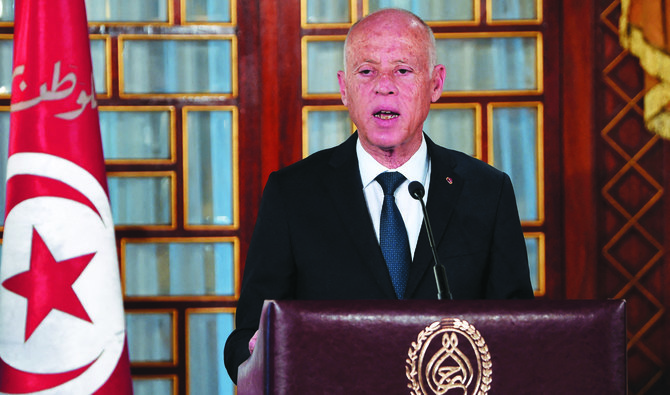
- ARAB NEWS
- 20 Apr 2024

TUNIS: Tunisia’s President Kais Saied on Tuesday defended a draft constitution set for a referendum this month, after the drafting committee’s chief disavowed a document he said could return the country to dictatorship.
The new constitution is the centerpiece of Saied’s plan to remake the North African country’s political system, over a decade after its pro-democracy revolt which sparked copycat uprisings across the region.
But Sadeq Belaid, the legal expert who oversaw the drafting of the new constitution, said the final version Saied published last week was “completely different” from his committee’s draft, and warned that some articles could “pave the way for a dictatorial regime.”
On Tuesday, Saied’s office published an open letter arguing that “this draft was built on what the Tunisian people have expressed from the start of the revolution (in late 2010) up until the correction of its path on July 25, 2021.”
That was the day Saied sacked the government, suspended parliament and seized wide-ranging powers in moves opponents have called a coup against the only democratic system to have emerged from the Arab Spring revolts.
Saied wants a presidential system to replace the country’s 2014 constitution, which enshrined a mixed presidential-parliamentary system often beset by deadlock and marred by corruption. “This draft which is proposed to you expresses the spirit of the revolution, and in no way threatens rights or freedoms,” Saied’s letter read.
He dismissed “those who slander and pretend” the document could return the country to tyranny, saying they had not read it in detail.
He urged Tunisians to vote to approve the new draft in the vote set for July 25, the first anniversary of his power grab.
“Say ‘yes’ so the state does not fail, so the revolution’s aims are achieved, so there will be no misery, terrorism, hunger, injustice and suffering,” he wrote.
Wheat crisis
Tunisian farmer Mondher Mathali surveys a sea of swaying golden wheat and revs his combine harvester, a rumbling beast from 1976 which he fears could break down at any moment.
Since the Ukraine war sent global cereal prices soaring, import-dependent Tunisia has announced a push to grow all its own durum wheat, the basis for local staples like couscous and pasta.
The small North African country, like its neighbors, is desperate to prevent food shortages and social unrest — but for farmers on the sun-baked plains north of Tunis, even the basics are problematic.
“I’d love to buy a new combine harvester, but I could only do it with help from the government,” said Mathali, 65. He reckons his outdated machine wastes almost a third of the crop. With spare parts hard to find, he fears a breakdown could cost him his entire harvest.
But even a second-hand replacement would cost him an unimaginable sum: $150,000.
“Our production and even the quality would go up by maybe 50 percent, even 90 percent” with government help, he said. “But our situation is getting worse and the state isn’t helping us.”
Tunisia’s wheat production has suffered from years of drought and a decade of political instability, with 10 governments since the country’s 2011 revolution.
AFP